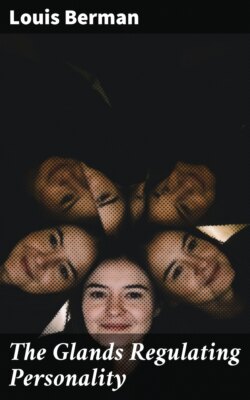Читать книгу The Glands Regulating Personality - Louis Berman - Страница 23
На сайте Литреса книга снята с продажи.
THE EXPERIMENTAL PIONEER
ОглавлениеAll this clarification of the concept of the glands of internal secretion occurred in the first quarter of the nineteenth century. However, no inkling of their real importance to the body, of which quantitatively they form so insignificant a part, was apparently revealed to anyone. Not even the most daring speculation or brilliant guess work in physiology engaged them as material. Thus Henle, the great anatomist, calmly affirmed that these glands "have no influence on animal life: they may be extirpated or they degenerate without sensation or motion suffering in the least." Johann Müller, the most celebrated physiologist of his day and contemporary of Henle, wrote in 1844 and coolly stated, "The ductless glands are alike in one particular—they either produce a different change in the blood which circulates through them or the lymph which they elaborate plays a special rôle in the formation of blood or of chyle." In other words, they were dismissed as curious nonentities, of no real significance to the running of the body. Laennec, the French founder of the Art of Diagnosis in Medicine, once said that nothing about a science is more interesting than the progress of that science itself. He might have added that nothing either was more interesting than the contradictions in that progress. For while these grand moguls of their sciences were enunciating their dogmas, pioneers here and there were already setting the mines that were to explode them.
The experimental method, to the value of which biologists were just beginning to awaken, was destined to be the vehicle of Time's revenges. An application of it to the mysteries of sex was the immediate occasion. Sex and sex differences have always more or less obsessed the imagination of mankind. The volumes of theories about them would constitute a respectable museum. Certain gross facts, however, were known. The effects of loss of the sex glands upon the configuration of the body and the predominating constitution in animals and eunuchs have always attracted attention. The proverbs and stories of all nations are full of references to them. But up to the nineteenth century no controlled experimental work was ever carried out regarding them. It was in 1849, that A.A. Berthold of Göttingen, a quiet, sedate lecturer, carried out the pioneer experiment of removing the testes of four roosters and transplanting them under the skin. It was Berthold's idea to test whether a gland with a definite external secretion, and a duct through which that secretion was expelled, but which yet had powers over the body as a whole that were to be attributed only to an internal secretion, could not be shown, by a clean-cut experiment, to possess such an internal secretion. He succeeded perfectly. For he found that, though, in thus separating the gland from its duct and so cutting off its external secretion, the action of the cells manufacturing that secretion was destroyed, the general effects upon the body were not those of castration. The animals retained their male characteristics as regards voice, reproductive instinct, fighting spirit and growth of comb and wattles. Whereas if the glands were entirely removed, these male traits, peculiar to the rooster, were completely lost. The inference was the existence of an internal secretion.
To Berthold belongs the honor of being the first experimental demonstrator who proved the reality of a gland with a true internal secretion and the power it exercised through the blood upon the entire organism. Besides, he showed that a typical gland of external secretion could also have an internal secretion, a possibility never before considered. That two kinds of cells could live within the same gland: one set usually recognized as producing the external secretion, the other evolving the internal secretion, was an astounding original conception.
